By Doha News Team

Less than one in five Qataris think people should be able to criticize governments online, according to a new media survey.
These nationals were also the least likely people in the region to feel safe discussing politics on social media.
That said, Qataris were also the least likely of their Arab peers to want increased regulation of web content.
These results were among the key findings of the fifth and latest edition of Northwestern University in Qatar’s annual Media Use in the Middle East Survey, published this week.
The wide-ranging study, the largest annual one of its kind in the Middle East, examines attitudes about freedom of speech.
It also covers trends in media and news usage across seven countries: Qatar, Saudi Arabia, the UAE, Lebanon, Tunisia, Jordan and Egypt.
More than 7,000 people in total — 1,000 in each country — were interviewed over the phone and in person between February and March this year, with some questions asked in the US for comparison.
Freedom of speech
The survey was undertaken before the blockade against Qatar began this summer and ahead of what has become a heated PR and information war between the two sides.
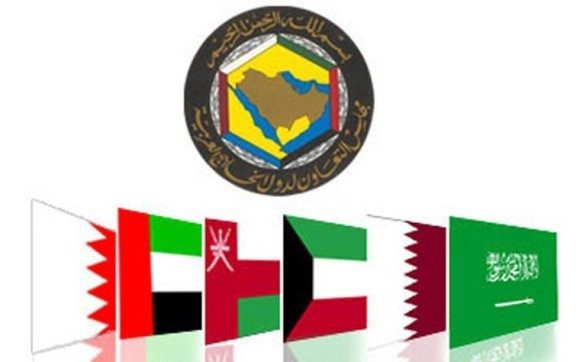
Since then, two of the blockading states — the UAE and Saudi Arabia — have made it illegal for their residents to publicly express support for Qatar.
Still, free speech has been an issue of contention in the region for a long time.
For example, just 13 percent of Qatari nationals agreed with the survey statement “on the internet, it is safe to say whatever one thinks about politics.”
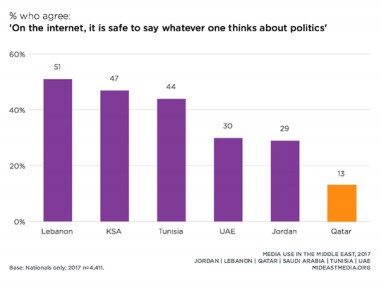
This was the lowest in the region, compared to nearly half of all Saudi nationals (47 percent), more than half (51 percent) of Lebanese and nearly one-third (30 percent) of Emirati citizens.
Expats living in Qatar were marginally more confident than their local peers. Some 27 percent of said they felt safe airing their views online.
Qatari citizens were also among the least likely to agree that people should be free to criticize governments on the internet.
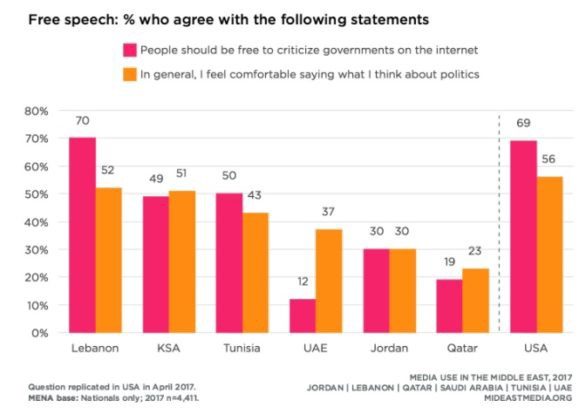
Fewer than one in five (19 percent) of nationals supported this view, compared with 49 percent of Saudi citizens and 70 percent of Lebanese nationals.
Again, more Qatar expats (34 percent) agreed with the statement, although they were still in the minority.
“These results suggest that while social media may provide an avenue for more freedom of expression, many remain reluctant to fully embrace that opportunity,” report co-author Everette E. Dennis, dean and CEO of NU-Q, said in a statement.
That said, only 39 percent of Qataris called for tighter regulation of the internet. And only one quarter were in favor of stricter controls of political content online in 2017.
This is a significant drop from last year, when 60 percent of Qataris called for more regulation.
Surveillance and privacy
Meanwhile, when asked about online surveillance, just 12 percent of Qataris said they were concerned about government spying.
One-third (32 percent) of expats in Qatar said the same.
Slightly more Qataris — 21 percent — said they were worried about private companies spying on them online, but these figures are still low compared to some of their regional peers.
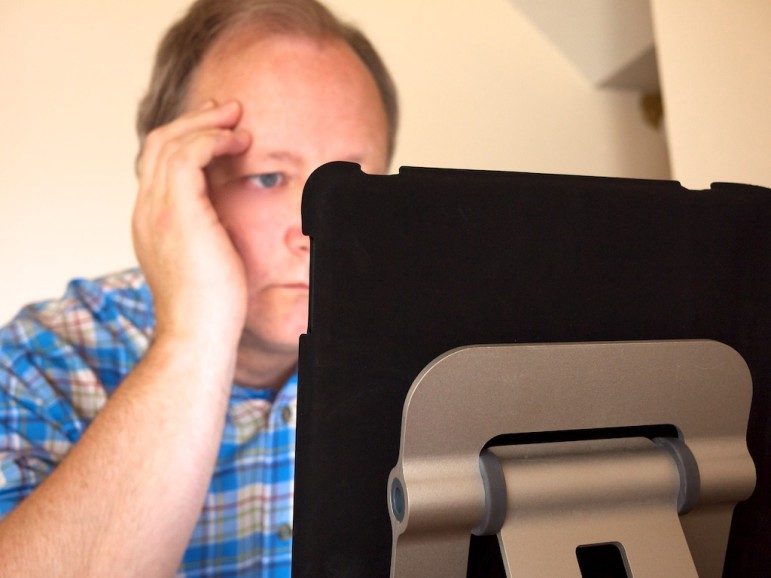
For example, half of all Saudi nationals were concerned about government and corporate surveillance online.
Across much of the Middle East, concern about online content has led to increasing support for greater regulation. On average, 61 percent of nationals support this.
But among Qataris, that support has fallen nearly 30 percentage points in the last two years.
In 2015, two-thirds of nationals (67 percent) called for this, while this year just 39 percent supported this view.
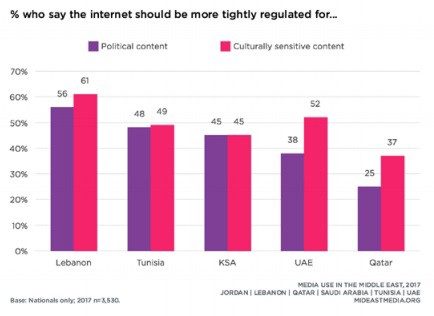
When asked more specifically about greater regulation of political content online, just 25 percent of Qataris called for this. Regarding increased regulation of culturally sensitive content, only 37 percent wanted this.
Regionally, many more nationals supported the call for more regulation:
- UAE: 52 percent;
- Saudi Arabia: 45 percent;
- Tunisia: 49 percent; and
- Lebanon: 61 percent.
Despite this, Qataris are much more conscious about protecting their online privacy, with more than half (53 percent) of nationals calling for increased regulation to ensure this.
Snapchat vs Facebook
Regarding being online, nearly all Qataris report owning a smartphone.

In fact, Qataris spend the longest on the internet of any of their peers, clocking up a total of 45 hours a week (more than six hours a day), compared to the regional average of 27 hours a week.
Much of this is on social media, and here Qataris have some unique preferences.
For example, Facebook use among Qataris has fallen from 65 percent in 2013 to 22 percent now. By comparison, 55 percent of Saudis said they use Facebook.
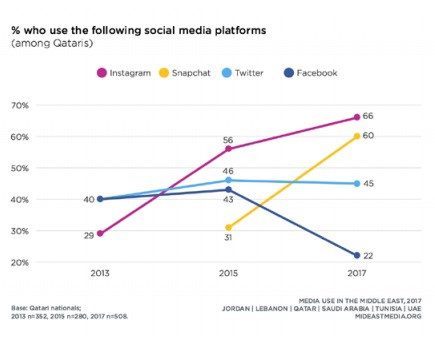
Facebook remains popular among expats in Qatar however, with some 70 percent of those surveyed saying they use it.
Meanwhile, some 64 percent of Qataris use Snapchat — in what the report authors reckon is the highest penetration globally.
Overall, WhatsApp continues to be the most widely used social media and communications tool, with 93 percent of nationals sending messages through it.
As for other social media, nearly half (48 percent) use Twitter and just over one-third (39 percent) use YouTube.
Getting news
Though people in Qatar are increasingly online, they are the least likely in the region to use news apps.
Only one-third of Qataris said they used them at all, compared to 85 percent of Saudis and 86 percent of Emirati nationals.
Qataris are also among the least willing in the region to pay for their news. Fewer than a quarter (24 percent) said they would buy content, down by 47 percentage points in the last two years.
However, they are the only nationals in the region where a majority (60 percent) feel international news coverage of their country is fair.
You can view the full survey results here, and use the interactive tool for detailed findings here.
Thoughts?






